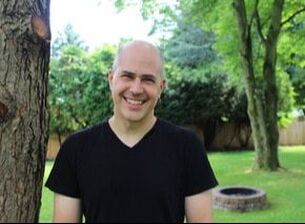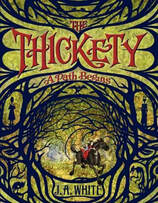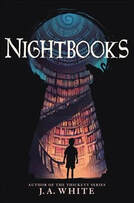| Interview by Piranha T. and Super Kitty J. A. White is the author of numerous middle-grade novels, including the Thickety quartet, beginning with A Path Begins (which we selected as one of our favorite books of 2020); Nightbooks, a modern twist on the tale of Scheherazade; and his latest novels, the Shadow School series. We like his books for their twisting plots and fully imagined worlds—we were thrilled to interview him for this month’s feature! Rapunzel Reads: A Path Begins has many unique, well-developed characters. Of them, do you have a favorite? If so, why? J. A. White: Thanks! My favorite character—indeed, my favorite of all my characters in all my books—is Grace. I know she’s an awful person, but that’s what made her so much fun! Also, I don’t outline my books, | Photo credit: Yeeshing White |
RR: What were your favorite books when you were growing up?
JAW: As you might imagine, I was (and am) a huge reader. Some of my favorite books as a kid were The Black Cauldron, A Wrinkle in Time, and The Three Investigators (a mystery series that was kind of like the Hardy Boys). I also loved fairy tales, Choose Your Own Adventure books, and scary comic books.
RR: What was the hardest part of writing the Thickety quartet?
JAW: The first two books are set on one island. Kara, the main character, has lived on this island her entire life and doesn’t know anything about the outside world. Since you always want to see the story through the eyes of your protagonist, I tried not to think much about what was out there either. By the time the third book came around, however, it was time to create the world. I felt a lot of pressure to get it right, so I spent four months planning everything out. It was the hardest part—but also a lot of fun!
RR: Throughout the Thickety series, there are a number of unexpected twists and new layers. How did you go about creating and planning those?
JAW: I wish I had a good answer for this one, but to be perfectly honest, I kind of make up the plot as I go along. I think some of the plot developments are surprising because the writer didn’t know they were going to happen either! For example, there’s a huge plot twist at the end of the first book that I didn’t know was going to happen until I was actually writing the chapter.
This method means it takes me a long time to write, because I’m constantly rewriting when things head off in a different direction, but it’s the only way that works for me. And I hope it gives my stories an organic feel where absolutely anything can happen.
RR: Do you have any advice for an aspiring author?
JAW: The most common advice is still the best: read. Read and read and read and read. Then read some more. Also, read short stories in addition to novels. You can learn so much from them.
It’s also important to write outside of school, even if it’s just for ten minutes a day! Make sure you write the types of stories that you want to read. And have fun! That’s probably the most important advice of all.






 RSS Feed
RSS Feed
